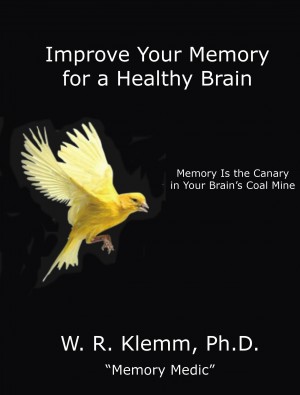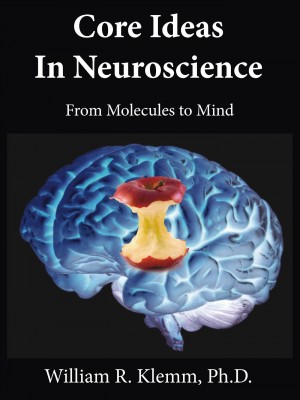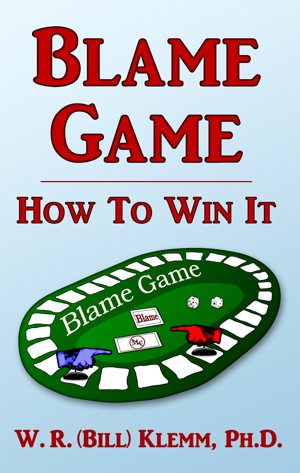Location: United States
Member Since:
Feb. 10, 2009
2 readers have added this author as a 'Favorite Author'.
W. R. Klemm
Biography
W. R. (Bill) Klemm, D.V.M., Ph.D.
Professor of Neuroscience, Texas A&M University
Distinguished Alumnus, Auburn University
Websites:
http://www.cvm.tamu.edu/wklemm
http://thankyoubrain.com
http://peer.tamu.edu
http://thankyoubrain.blogspot.com (Improve Learning and Memory blog)
Biographical Listings:
Who’s Who in America + 18 others
Education:
Doctor of Veterinary Medicine, Auburn U., 1958;
Doctor of philosophy, U. Notre Dame, 1963
Professional Activities, as a ...
Scientist:
Research Areas: include brainstem mechanisms of behavior, alcohol, learning/memory, chemical signals, human cognition and EEG, educational research.
Discoveries: (range from model membranes to human cognition)
1) radiation induces an adrenal stress response,
2) at a time when scientists thought ruminants did not sleep, proved that they not only sleep but also dream,
3) ethanol selectively acts on certain neurons,
4) opiates selectively act on certain neurons,
5) rhythmic activity in the hippocampus reflects a widespread activating influence of the brainstem reticular formation that is not necessarily associated with movement.
6) ethanol displaces hydrogen bonded water on membrane lipid,
7) freeze behavior ("animal hypnosis") is a brainstem-mediated reflex,
8) neuronal spike trains contain sequential interval codes in certain clusters of impulses (i.e., they can act like a "byte" processor)
9) acetaldehyde in body fluids is a biochemical marker for estrus and ovulation,
10) sex hormones promote memory consolidation,
11) multiple areas of cerebral cortex become synchronized at various frequencies during memory recall and "eureka" phenomenon.
Editorial Board Member: 11 scholarly journals.
Reviewer of approximately 1,000 scientific papers for over 55 journals.
See list of over 450 publications, which have been formally cited over 2,000 times according to Citation Index. Also, 13 books (Bobbs-Merrill, Academic Press, Wiley, C. C Thomas, Mosby)
Professor: Texas A&M University (1966-present)
o College of Veterinary Medicine, Texas A&M Univ. (1980-present): taught Introductory Neuroscience. a Drug and Substance Abuse Seminar, Science and Technology Practices and Policies, and graduate neuroscience courses.
o College of Science (1966-1980): taught animal physiology, animal behavior, introductory biology, graduate neuroscience courses
o College of Veterinary Medicine, Iowa State University (1963-1966): taught pharmacology and graduate physiology courses.
Writer: 13 books, including Animal Electroencephalography; Applied Electronics in Veterinary Medicine & Animal Physiology; Science, The Brain, and Our Future; Discovery Processes in Modern Biology; Brainstem Mechanisms of Behavior; Understanding Neuroscience; Global Peace Through the Global University System; Thank You, Brain, For All You Remember. What You Forgot Was My Fault ,and 'Dillos. Roadkill on Extinction Highway.
Speaker: hundreds of presentations to clubs, cruise line, workshops, professional meetings.
Other:
o Colonel, U.S. Air Force Reserves (Ret.) - Research and development planning, Human Systems Division
o Company President - co-founder of Forum Enterprises, Inc., maker of collaboration software (FORUM)
o Consultant - clients have included U.S. Air Force, A. H. Robbins Co., Dow Chemical Company, RCA, The Fielding Institute, U.S. Dept. Agriculture, Vinson & Elkins Attorneys, Int. Flavors & Fragrances Co.
o Project Director for five educational outreach grants (NIH, NSF) to middle schools, community colleges, and post-graduate animal-health professionals.
Professor of Neuroscience, Texas A&M University
Distinguished Alumnus, Auburn University
Websites:
http://www.cvm.tamu.edu/wklemm
http://thankyoubrain.com
http://peer.tamu.edu
http://thankyoubrain.blogspot.com (Improve Learning and Memory blog)
Biographical Listings:
Who’s Who in America + 18 others
Education:
Doctor of Veterinary Medicine, Auburn U., 1958;
Doctor of philosophy, U. Notre Dame, 1963
Professional Activities, as a ...
Scientist:
Research Areas: include brainstem mechanisms of behavior, alcohol, learning/memory, chemical signals, human cognition and EEG, educational research.
Discoveries: (range from model membranes to human cognition)
1) radiation induces an adrenal stress response,
2) at a time when scientists thought ruminants did not sleep, proved that they not only sleep but also dream,
3) ethanol selectively acts on certain neurons,
4) opiates selectively act on certain neurons,
5) rhythmic activity in the hippocampus reflects a widespread activating influence of the brainstem reticular formation that is not necessarily associated with movement.
6) ethanol displaces hydrogen bonded water on membrane lipid,
7) freeze behavior ("animal hypnosis") is a brainstem-mediated reflex,
8) neuronal spike trains contain sequential interval codes in certain clusters of impulses (i.e., they can act like a "byte" processor)
9) acetaldehyde in body fluids is a biochemical marker for estrus and ovulation,
10) sex hormones promote memory consolidation,
11) multiple areas of cerebral cortex become synchronized at various frequencies during memory recall and "eureka" phenomenon.
Editorial Board Member: 11 scholarly journals.
Reviewer of approximately 1,000 scientific papers for over 55 journals.
See list of over 450 publications, which have been formally cited over 2,000 times according to Citation Index. Also, 13 books (Bobbs-Merrill, Academic Press, Wiley, C. C Thomas, Mosby)
Professor: Texas A&M University (1966-present)
o College of Veterinary Medicine, Texas A&M Univ. (1980-present): taught Introductory Neuroscience. a Drug and Substance Abuse Seminar, Science and Technology Practices and Policies, and graduate neuroscience courses.
o College of Science (1966-1980): taught animal physiology, animal behavior, introductory biology, graduate neuroscience courses
o College of Veterinary Medicine, Iowa State University (1963-1966): taught pharmacology and graduate physiology courses.
Writer: 13 books, including Animal Electroencephalography; Applied Electronics in Veterinary Medicine & Animal Physiology; Science, The Brain, and Our Future; Discovery Processes in Modern Biology; Brainstem Mechanisms of Behavior; Understanding Neuroscience; Global Peace Through the Global University System; Thank You, Brain, For All You Remember. What You Forgot Was My Fault ,and 'Dillos. Roadkill on Extinction Highway.
Speaker: hundreds of presentations to clubs, cruise line, workshops, professional meetings.
Other:
o Colonel, U.S. Air Force Reserves (Ret.) - Research and development planning, Human Systems Division
o Company President - co-founder of Forum Enterprises, Inc., maker of collaboration software (FORUM)
o Consultant - clients have included U.S. Air Force, A. H. Robbins Co., Dow Chemical Company, RCA, The Fielding Institute, U.S. Dept. Agriculture, Vinson & Elkins Attorneys, Int. Flavors & Fragrances Co.
o Project Director for five educational outreach grants (NIH, NSF) to middle schools, community colleges, and post-graduate animal-health professionals.
Smashwords Interview
Where to find W. R. Klemm online
Website: http://BlameGame.us
Twitter: @wrklemm
Facebook: Facebook profile
LinkedIn: https://www.linkedin.com/in/wrklemm/
Blog: http://thankyoubrain.blogspot.com
Twitter: @wrklemm
Facebook: Facebook profile
LinkedIn: https://www.linkedin.com/in/wrklemm/
Blog: http://thankyoubrain.blogspot.com
Where to buy in print
Books
Learn How to Learn. In Just 10 Easy Steps
by W. R. Klemm
Price:
$3.95 USD.
Words: 26,790.
Language:
English.
Published: April 2, 2021
.
Categories:
Nonfiction » Education & Study Guides » Adult & continuing education
This short and simple 10-step program can make every learner succeed in school or workplace training programs. The book is extensively interactive, with numerous links within the document itself and to supplementary web sites. Each step has links to a distinct summary and is followed by a quiz and quiz answers.
Improve Your Memory for a Healthy Brain. Memory Is the Canary in Your Brain's Coal Mine
by W. R. Klemm
Price:
$4.99 USD.
Words: 61,460.
Language:
English.
Published: November 25, 2014
.
Categories:
Nonfiction » Health, wellbeing, & medicine » Aging well
Authoritative, well researched and documented, this book provides in-depth explanations on topics such as brain aging, relationships of memory with other brain functions, how to reduce absent-mindedness, the diseases of aging, and diet and supplements. The author, a neuroscientist and teacher for over 50 years,explains practical application of research-based ideas for improving memory.
Core Ideas in Neuroscience
by W. R. Klemm
Price:
$6.95 USD.
Words: 111,770.
Language:
English.
Published: December 22, 2013
.
Categories:
Nonfiction » Science & Nature » Biology
Everybody needs to know something about their brain. But who wants to wade through a tedious textbook that tells you far more than you want to know? This book is organized as modules explaining the basic principles of 75 core ideas. You don’t have to wade through it. You can dance through it, easily getting up to speed on just the few ideas you may need to know about at the moment.
Better Grades, Less Effort
by W. R. Klemm
Price:
$3.99 USD.
Words: 33,690.
Language:
English.
Published: September 18, 2010
.
Categories:
Nonfiction » Education & Study Guides » Study skills
(4.83 from 6 reviews)
This book is for any working professional engaged in on-the-job training programs. It will also help workers master their field and become more competent — more likely to be successful. The book will have special value for students, especially those in high school or college. It will also help elementary school children, though the tips should be read and explained by the parents.
Blame Game. How To Win It
by W. R. Klemm
Price:
$2.99 USD.
Words: 53,370.
Language:
English.
Published: February 10, 2009
.
Categories:
Nonfiction » Self-improvement » Confidence & self-esteem
Acclaimed by the famous "Dr. Laura" and theologian Dr. Robert Schuller, Blame Game helps you know when you are making excuses and what to do about it. The book helps people examine their excuses place and blame where it really belongs.This book provides "debt relief" for the high cost of excuse-making. The book presents a 5-step program to move from denial and deception to deliverance.
W. R. Klemm's tag cloud
aging gracefully
blame
brain
brain activity
brain diseases
brain health
brain research
cognition
confidence
consciousness
dementia
diet and supplements
dreaming
education
excuses
fulfillment
happiness
health
health fitness
learning
love
memory
memory advice
memory mechanisms
neural circuitry
neural network
neural transmission
psychology
responsibility
school success memory selfhelp learning grades study tips
self help
selfesteem
selfhelp
sleep
success
training
Smashwords book reviews by W. R. Klemm
-
Boot Camp Fitness for All Shapes and Sizes
on Nov. 28, 2010
(no rating)
Inspired by his boot camp Army recruits, Lt. Col. Bob Weinstein (U.S. Army, Retired) lays out a "complete" program for physical fitness. Unlike virtually all other fitness books, Weinstein addresses the psychological and even spiritual changes that are so helpful in motivating a person to "be all you can be," as they like to say in the Army. Weinstein points out that his program is a health insurance policy, one where your premiums will be made up of healthy eating, regular exercise and healthy thoughts. His program might not lower your insurance premiums. Given the new Obama-care bill, I guess nothing will. But if you do what Weinstein says, you have really good odds of being healthier and happier. The book not only provides physical exercises, but shows how lifestyle, attitude, and personal values are important to healthy living. There is a spiritual dimension to this book which may not resonate with some readers, but I encourage them to consider that personal values are absolutely essential for providing the motivation to stay with any program involving diet and exercise. Col. Bob challenges readers to "war game" their health. The essence of the game is to assess where you are in degree of health, develop a boot-camp remediation plan, and make it happen. He won't accept denial. He points out that 90% think most people are overweight, but only 40% admit that THEY are overweight. To test whether a person is in denial, the book provides a simple "Health/Lifestyle Test." A big emphasis is placed on weight loss, with the appropriate emphasis on limiting calories -- no fad diets needed. The book doesn't provide recipes, just points out the obvious: eat less in total, and eat fewer proteins and fats. The section on exercise begins with effective debunking of common myths about exercise. The actual program is not what you would expect from a drill sargeant. Lt. Col. Weinstein insists that exercise should be fun. He provides fitness criteria based on pushups, situps, and 2-mile run/walk time. Army standards for pushups and situps are significantly more than most people can do initially. An extensive array of exercises are explained and clearly illustrated with photographs. One of the best features of these exercises is that no equipment is needed for any of them, except for resistance bands. The only dumbells are those who don't take Col. Bob's advice. The book includes advice for creating corporate wellness plans. Bottom line: wsellness programs save the company money. Weinstein runs boot-camp workouts on the Fort Lauderdale beach. That sounds like a fun way to get started on life-change. In case that is not feasible, by all means get started with this book.The success stories from his camp graduates are inspiring. Speaking of inspiring, its hard to beat the quote from psychiatrist William James that Col. Bob uses as the book's theme: "Most people never run far enough on their first wind to find out they've got a second." Bill Klemm, Col. USAFRes (Ret.) "Memory Medic," http://thankyoubrain.com
-
Writing Your Book: Cashing in on publishing faster, easier, and cheaper
on Dec. 28, 2012
(no rating)
Poynter’s book lives up to its theme of “faster, easier, and cheaper.” This is a quick read that says a lot in a hurry. It is not as detailed as his other books on publishing, but he has numerous hyperlinks to multiple resources. This way, you don’t have to wade through a lot of stuff you don’t want to know. His tips of market research are especially useful. My tendency as a writer is to pick topics that have been neglected. He stresses a need to publish on topics that are known to sell, which means there are already books on the topic. His book tells you how to find out what books people want to buy and helps the writer to jump right in and give the crowd what it wants. Bill Klemm, Smashwords author of Better Grades. Less Effort.






